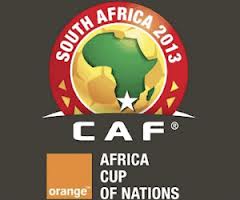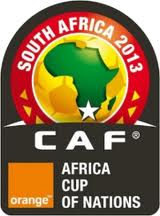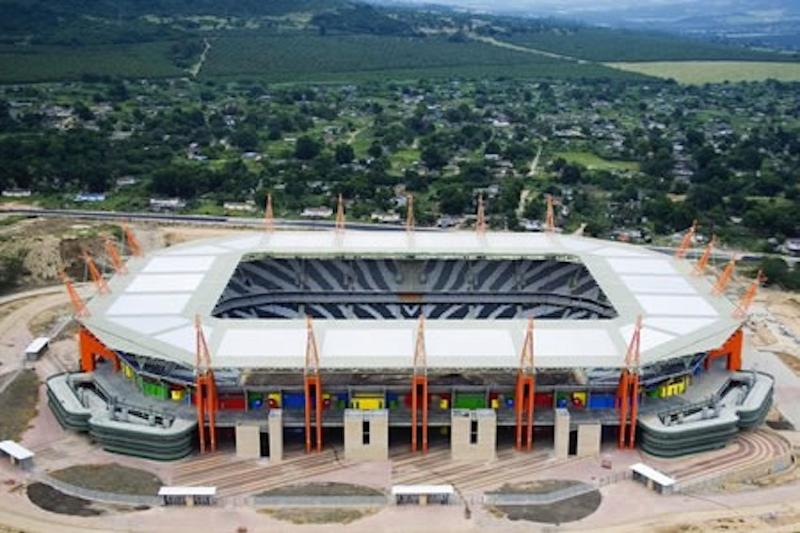2013 Africa Cup of Nations Finals – Monday 11 February 2013
2013 AFCON Final
Nigeria (1) 1 – 0 (0) Burkina Faso
National Stadium, Johannesburg
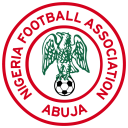 Looking at the players as the national anthems played, the Burkina Faso team looked more nervous than their West African neighbours Nigeria. Burkina Faso had Pitroipa in the team after his Semi-Final sending-off was overturned, whilst Alain Traoré was still not fit. For Nigeria, Victor Moses was passed fit, but Ikechukwu Uche replaced the injured Emmanuel Emenike. The pitch in Johannesburg whilst not as bad as that in Nelspruit, didn’t look as good as some of the other venues used in the tournament, and appeared to be still recovering from hosting a recent Red Hot Chili Peppers concert.
Looking at the players as the national anthems played, the Burkina Faso team looked more nervous than their West African neighbours Nigeria. Burkina Faso had Pitroipa in the team after his Semi-Final sending-off was overturned, whilst Alain Traoré was still not fit. For Nigeria, Victor Moses was passed fit, but Ikechukwu Uche replaced the injured Emmanuel Emenike. The pitch in Johannesburg whilst not as bad as that in Nelspruit, didn’t look as good as some of the other venues used in the tournament, and appeared to be still recovering from hosting a recent Red Hot Chili Peppers concert.
Nigeria started the more positively and had the first corner on six minutes, which was punched away continental style by Daouda Diakité in goal for Burkina Faso. Just a couple of minutes later, The Super Eagles were awarded a free-kick although it was a dive from Brown Ideye which had conned referee Haimoudi Djamel. The resultant free-kick found Efe Ambrose unmarked, but he headed wastefully off target. Nigeria were soon back on the attack and on nine minutes, Victor Moses won a corner for Nigeria. As the ball came in, Daouda Diakité left his line to gather but succeeded only in spilling it and was grateful to see Brown Ideye loft his attempt over the bar. Burkina Faso were looking nervous and hadn’t settled and it was not until the fifteen minute mark that they won their first corner after good work by Jonathan Pitroipa. However, the respite for The Stallions didn’t last long as on twenty minute, Moses, having swapped wings, crossed dangerously into the box which Daouda Diakité was grateful to gather at the second attempt. Gradually though Burkina Faso began to work their way into the game and had a good spell which produced two attempts on goal from Aristide Bancé. First on twenty four minutes, with his back to goal, he controlled a long ball on his chest, before swivelling and firing a shot over the Nigerian crossbar. Three minutes later Bancé had a better opportunity from a free-kick, but he dragged the effort badly wide. With half an hour gone, the game got a little scrappy with possession too easily given away by both sides and which saw the first booking of the Final when Florent Rouamba was cautioned for a foul on Moses on thirty three minutes. A second booking quickly followed on thirty eight minutes, when Ogenyi Onazi’s name went into the referee’s book. From the resulting free-kick, poor Nigerian marking allowed Bakary Koné a free header at the back post, but his effort was wide as he went for glory rather than heading the ball back into the danger area. On forty minutes the deadlock was broken; Brown Ideye won possession in midfield and flicked the ball onto Ikechukwu Uche who slipped it inside to Victor Moses. The Nigerian forward continued into the box and despite nearly losing possession fired off a shot which ricocheted out of the penalty box. Sunday Mba controlled the ball on his thigh as he went into the penalty area, flicked it over an advancing defender with his right foot before volleying home with his left, leaving Daouda Diakité rooted to the spot. An incredible piece of skill and a goal worthy of a Final. Burkina Faso though came straight back at Nigeria and Bancé again found himself in a good position on forty three minutes, but after good control, fired high and wide. Two added minutes were played and Nigeria created the last chance of the half, when Mba shot wastefully over the bar.
Nigeria went in at half-time ahead 1-0 and deserved their advantage. However, Burkina Faso knew that it was only a single goal deficit and had come from behind more than once in their 2013 AFCON journey.
Neither team made any changes for the start of the second-half and Nigeria were soon back in their stride, as Moses got down the right wing and flashed an attempt across the face of the Burkina Faso goal on forty eight minutes. The Chelsea player was causing problems on both flanks, and won Nigeria’s first corner of the second period on fifty two minutes. The first substitutions of the game came on fifty four minutes, when Ahmed Musa replaced Ikechukwu Uche. Whilst having put in an honest shift for Nigeria, the Villarreal striker had been unable to fill fully the gap left by the injured Spartak Moscow striker Emmanuel Emenike. On fifty four minutes Burkina Faso won their first corner of the second period, but it nearly proved costly as Nigeria broke quickly on the counter-attack and were grateful that Victor Moses couldn’t capitalise as his effort on goal was blocked. The next bit of significant action on fifty seven minutes fell to the referee as he booked Nigerian Kenneth Omeruo for a foul on Florent Rouamba. The Nigerians clearly thought that The Stallions player had made a meal of the challenge and as a result of his protests John Obi Mikel was also booked. When play did resume Bancé flicked a header goal-wards, but straight at Vincent Enyeama. Just after the hour mark there was a flurry of substitutions as both coaches looked to change the course of the game. On sixty five minutes Wilfried Sanou replaced the struggling Florent Rouamba, whilst a minute later, Nigeria brought on Juwon Oshaniwa for Elderson Echiejile. The substitutions did little for the rhythm of the game as it entered a scrappy phase midway through the second-half. After being on the field for five minutes The Super Eagles’ Juwon Oshaniwa was booked for a foul on Charles Kaboré. Despite it being in a good position wide out on the right, Burkina Faso wasted it with a poor delivery. With less than twenty minutes remaining Nigeria were looking to defend their lead and had to hold firm as The Stallions won three consecutive corners. They came to nothing and indeed Nigeria broke away on a quick counter. Moses played in Musa, but the forward tripped on the poor surface and the chance was gone. On seventy three minutes, Burkina Faso had their best opportunity of the game, when Wilfried Sanou had a shot destined for the far corner brilliantly tipped round the post by Vincent Enyeama. However, no corner was awarded and The Stallions best chance had gone. As the clock continued to tick down the tension mounted, although real chances were few and far between. With ten minutes remaining goal-scorer Mba had a long range effort on goal but it was high and wide. Then shortly after Burkina Faso had a free-kick in a promising position, but as with their all their dead-ball strikes in the Final it was another effort that was badly wasted, this time by Keba Paul Koulibaly. That was pretty much his last contribution as on eighty four minutes he was replaced by Moumouni Dagano. With just five minutes remaining Nigeria had two chances in a minute to seal victory, first Victor Moses was unable to take the chance presented after a defensive mistake and then from an Ahmed Musa cross, Brown Ideye was unable to apply the finishing touch. With eighty nine minutes on the clock, the goal-scoring hero Mba gave way for Joseph Yobo as Nigeria looked to close out the game and Burkina Faso had one last throw of the dice as Djakaridja Koné was replaced by Abdou Razack Traoré. Four minutes of added-time was played and Burkina Faso had got a late leveller against Nigeria in the earlier Group fixture, so hoped for a repeat. They had a half-chance two minutes into time added-on, as Brown Ideye was booked for handball and Burkina Faso were presented with a free-kick in a useful position. However, substitute Moumouni Dagano could only strike it fruitlessly into the crowd. The Stallions pumped one last long ball into the box as the four minutes were up; Vincent Enyeama confidently collected it and the referee blew for time. Nigeria were Champions of Africa for the third time.
The right team had won on the night and with a glorious goal that was worthy of winning a Final. Neither side had hit the heights of some of their earlier performances. Nigeria did enough to win the game and looked like they had more in reserve. Coach Stephen Keshi had caused a few raised eye-brows by going with some home-based players over ‘bigger’ European-based names in his squad selection, but this triumph handsomely answered those critics. For Burkina Faso to have even reached the Final was an incredible achievement, but at the last hurdle perhaps didn’t believe that they could win it. They looked nervous prior to kick-off and never showed the intensity and belief that was displayed for instance in the Ghana game. Perhaps the exertions of having gone to Extra-time in both the Quarter and Semi-Final had taken its toll? To have a chance their ‘big’ players had to spark for The Stallions, but on the night the highly rated Jonathan Pitroipa was on the whole anonymous. Not a classic Final, but one that will be remembered for a stunning strike from Warri Wolves’ Sunday Mba and a crucial save from Vincent Enyeama.
Congratulations The Super Eagles – 2013 AFCON Champions.
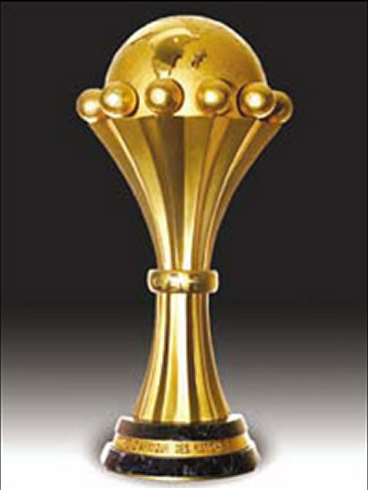 For both these teams, the qualification games they played in order to progress to the 2013 AFCON Finals must seem a lifetime away. Nigeria started their journey back in February 2012, when they played out a 0-0 with Rwanda in Kigali in the First-Leg of their First Round game. In June 2012 in the Second-Leg, goals from Ikechukwu Uche and Ahmed Musa saw The Super Eagles through 2-0 on aggregate. In September 2012, Nigeria travelled to Liberia, where the First-Leg game finished 2-2. The Second-Leg was a pretty comfortbale affair with Nigeria winning 6-1 with goals from Efe Ambrose, Ahmed Musa, Victor Moses (2), John Obi Mikel and Ikechukwu Uche. This 8-3 aggregate win saw Nigeria through to the Finals in South Africa.
For both these teams, the qualification games they played in order to progress to the 2013 AFCON Finals must seem a lifetime away. Nigeria started their journey back in February 2012, when they played out a 0-0 with Rwanda in Kigali in the First-Leg of their First Round game. In June 2012 in the Second-Leg, goals from Ikechukwu Uche and Ahmed Musa saw The Super Eagles through 2-0 on aggregate. In September 2012, Nigeria travelled to Liberia, where the First-Leg game finished 2-2. The Second-Leg was a pretty comfortbale affair with Nigeria winning 6-1 with goals from Efe Ambrose, Ahmed Musa, Victor Moses (2), John Obi Mikel and Ikechukwu Uche. This 8-3 aggregate win saw Nigeria through to the Finals in South Africa. Mali (0) 1 – 4 (3) Nigeria
Mali (0) 1 – 4 (3) Nigeria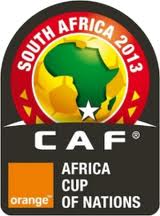 Mali v Nigeria
Mali v Nigeria